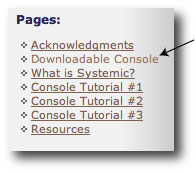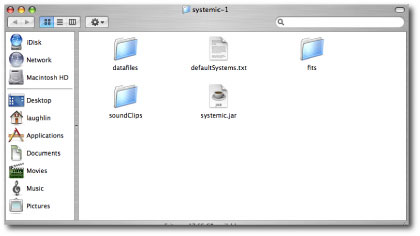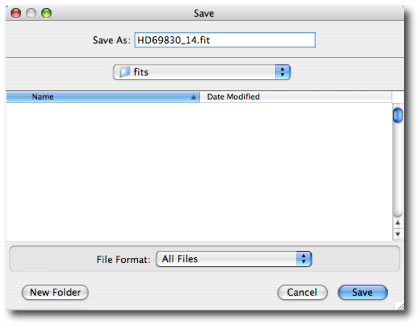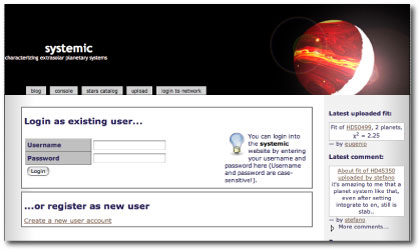
I think we’ve finally got the pieces in place. Its time to really push the collaborative aspect of the systemic project. (1) Aaron’s downloadable console has been tested, updated, and is known to work on Mac, Linux, and Windows platforms. (2) Stefano’s systemic back-end collaborative space is tested and working. (3) Eugenio and Paul are standing by and ready to provide technical support. (4) We’ve got nearly 400 unique users visiting oklo.org every day, and (5) with HD 69830, we have an extremely interesting new system to subject to the analytical and computational power of the distributed oklo community.
The questions to be answered are (1) is the published HD 69830 fit unique? and (2) can we get an independent estimation of the errors?
To get an initial analysis of these questions, I’d like to invite (and encourage!) the oklo community to use the console and the back-end environment to obtain a wide variety of fits to a new set of 21 radial velocity datasets. These data have been uploaded onto the web-based console, and they are also packaged into an updated version of the downloadable console. The data sets include the published HD 69830 data, along with 10 bootstrapped datasets, and 10 model-based synthetic data sets. I’ll write much more about bootstrapping and synthetic data sets in upcoming posts. For the time being, we’re simply interested in finding a variety of fits to these data.
The rest of this post will take the form of a brief tutorial to get you going. We really need as many people as possible to participate in this effort.

First, download the console onto your computer. The link to the downloadable console on the right menu bar gives download instructions. If you’re using a non-US English character set on a Windows machine, you will need to switch to the US English set. (We’ll have a fix in for this shortly.) Launch the console on your computer.
Note that the console application, “systemic.jar” is contained in a directory (folder) that contains several subdirectories. These subdirectories are named “datafiles”, “fits”, and “soundClips”:

When the console is running, select one of the HD69830 data sets from the system menu, and obtain a fit. Once you’ve got the fit, use the “save” button (a new feature of the downloadable console) to save the fit in the “fits” directory. Use the suffix “.fit”, as shown below:

Next, point your web-browser to the systemic back-end. The full url is: http://www.oklo.org/php/login.php

You’ll see the login page. Register as a new user. Once you’re logged in, the environment is designed to be as self-explanatory as possible. In particular, you can upload your fit from your computer, and compare it with other users’ fits to the same system. Go ahead and explore! The back-end contains a number of very interesting features, which we’ll look at in the next post.

Sounds like a good idea. I was hoping to get to play around with the console and this was a good excuse. I’ll take dataset 16.
I am having a technical difficulty though. The periodogram window won’t pop up for me. Everything else works okay. If I don’t have any planets checked, I can get a periodogram of the residuals. Then I can add planets and update that periodogram. (If I start with a planet on a 10000-day orbit, then the “residuals” periodogram is virtually the same as the full periodogram, but this is a workaround.) I’m running the console at work with Linux Red Hat and “java -version” at the terminal prompt gives me:
java version “1.4.2_06”
Java(TM) 2 Runtime Environment, Standard Edition (build 1.4.2_06-b03)
Java HotSpot(TM) Client VM (build 1.4.2_06-b03, mixed mode)
May I also make a couple of suggestions for future versions of the console? It’s awesome as it is, believe me, but it would be nice to have a back/undo key that would take you back to your previous parameters after a bad fit. Also, why can’t we sort the periodogram results by power instead of reverse period?
It will be interesting to see the results of this post.
Darin
By the way, the reported RMS is 0.81 (overall) with a reduced chi-square of 1.20. Any fits that are nearly as good will be interesting, especially with only two planets.
Hi Darin,
Yes, I see that the periodograms aren’t coming up. This must be something that happened yesterday when we put the new systems in the downloadable console. Aaron is gone today, but Eugenio and I will look in to it, and get a workaround this afternoon.
best,
Greg
Greg-
Using the “residuals” periodogram, I was able to get a good fit for HD69830_16, which I posted, and also HD69830. I haven’t found any other fits to the data as good as the one published.
Another suggestion for the console is to allow the integrator to include an inclination for the system. As it is, it only considers minimum masses, which is nice, but insufficient for real fitting.
Darin
Darin,
Thanks for the feedback.
All your points are very well taken. Aaron is implementing threading into the Java code so that we can have a “stop” and a “back” button. The periodogram reporting will also be udpated. I know that it’s a bit frustrating to not be able to sort by power if there are several near-equal peaks in the same period decade. Inclination sliders are also in the works, although these will get rolled out on a slightly longer timescale. Note that to date, GJ 876 (and perhaps 55 Cancri) are the only extrasolar planetary systems for which we truly can extract inclination information from the radial velocities.
Also, we’ve identified the issue that’s causing problems for HD69830_16 and all of the other bootstrap-process data sets. The times of observation were not ordered sequentially. We’re fixing this, and will get a fresh downloadable package up on the site by the end of today.
Keep those fits coming!
Greg
Pingback: systemic - Divide and conquer.